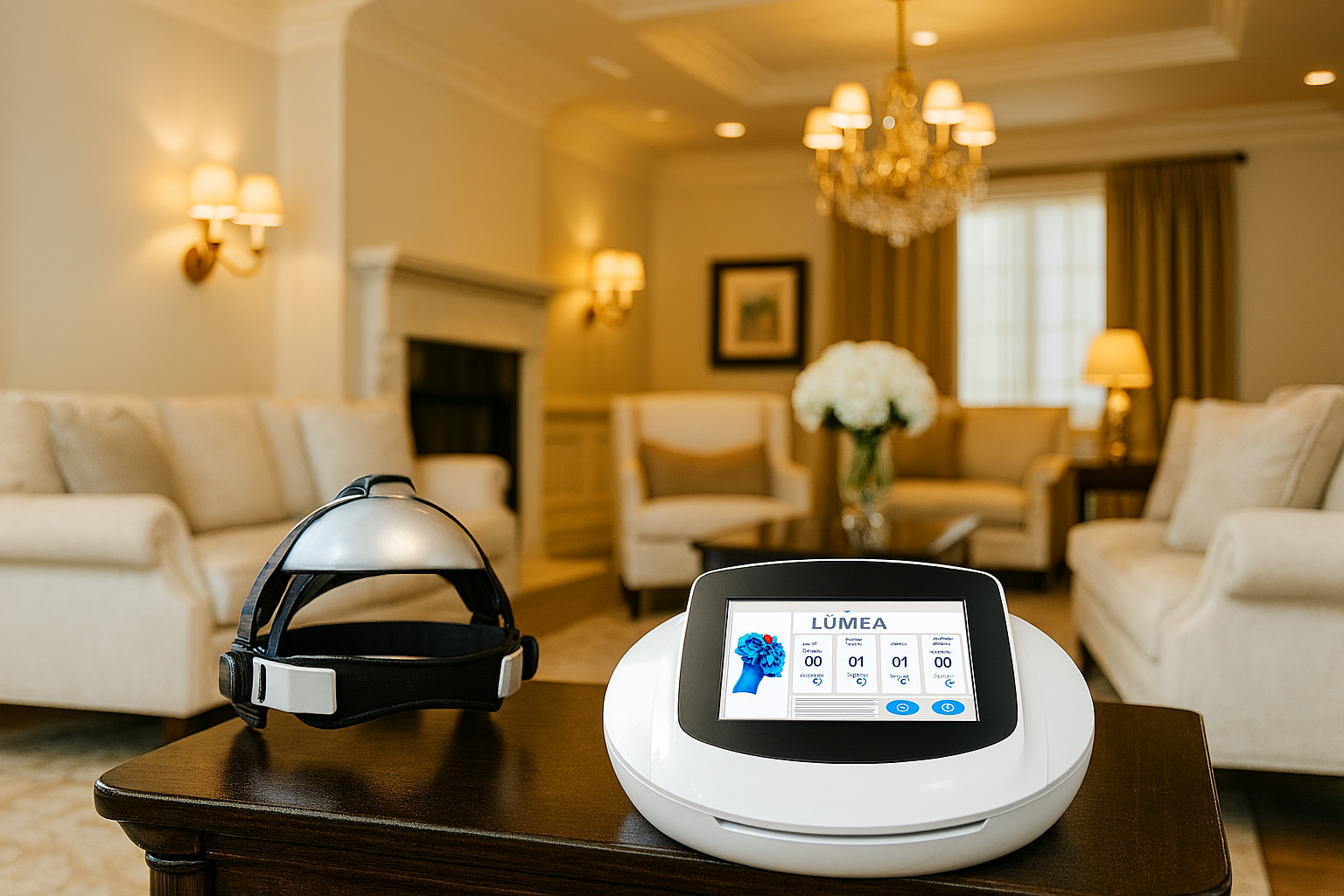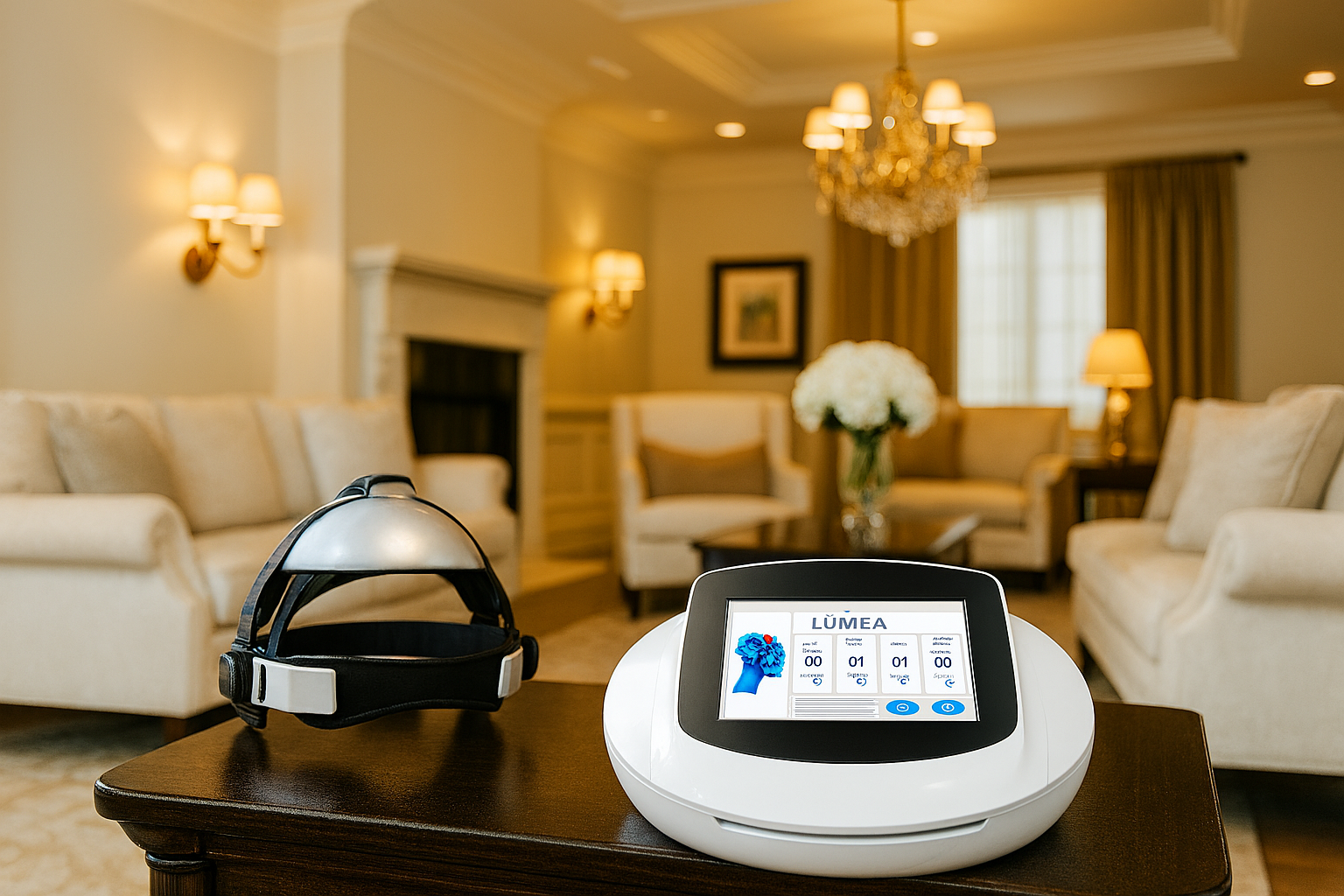
Depression is one of the most prevalent mental health conditions worldwide, and many individuals struggle to find a treatment that works. Traditional methods, like medication and psychotherapy, may not always deliver the relief needed. This is where Transcranial Magnetic Stimulation (TMS) comes in a non-invasive, cutting-edge therapy offering hope to those with treatment-resistant depression. And now, with the Lumea Brain Rehab device, you can bring the power of neurostimulation into your home.
What Is TMS and How Does It Work?
TMS is a revolutionary therapy that uses magnetic pulses to stimulate nerve cells in the brain, particularly those areas involved in mood regulation. The treatment targets regions like the prefrontal cortex, which is often underactive in people suffering from depression. By enhancing neural activity, TMS works to "reset" these brain circuits, helping restore balance and improve mood.The Lumea Brain Rehab device offers an at-home solution, mimicking the effects of clinical TMS therapy, so you can experience neurostimulation in the comfort of your own space.
Benefits of TMS and Using the Lumea Brain Rehab Device
- Non-Invasive and Convenient: No surgery, no pills—just a safe, effective way to manage depression.
- Minimal Side Effects: TMS is associated with fewer side effects compared to antidepressant medications, making it a gentler option.
- FDA-Approved: TMS has been recognized by the FDA as a safe and effective treatment for depression, making it a reliable choice for those with chronic or resistant symptoms.
- Sustained Results: Studies show that many individuals experience lasting relief from depressive symptoms following TMS therapy, with benefits that extend well beyond the treatment period.
- Home Use Flexibility: The Lumea Brain Rehab device allows you to perform neurostimulation treatments at home, saving time and offering flexibility without the need for frequent clinical visits.
Clinical and Scientific Evidence Supporting TMS
Numerous clinical studies have highlighted the effectiveness of TMS in treating depression, particularly for those who have not found relief through other treatments:
- Meta-Analysis Findings: A meta-analysis showed TMS’s strong efficacy in treating depression, with improvements seen in many patients after a series of treatments (uclahealth.org).
- Real-World Applications: Studies have shown that patients receiving TMS experience significant reductions in depression severity scores and better overall mental well-being (pmc.ncbi.nlm.nih.gov).
- Long-Term Benefits: Long-term studies show that the effects of TMS can be sustained, with many patients experiencing relief for months after completing the therapy (time.com).
With the Lumea Brain Rehab device, you can integrate this clinically backed therapy into your daily life, maintaining the benefits from the comfort of your home.
The Science Behind TMS and the Lumea Brain Rehab Device
TMS works by using magnetic fields to induce electrical currents in specific brain regions. This gentle stimulation can help normalize brain activity, particularly in areas associated with mood and emotional regulation. The Lumea Brain Rehab device uses similar principles, delivering safe neurostimulation pulses that can enhance neural plasticity, potentially "retraining" your brain to respond more effectively to mood regulation.This approach is scientifically supported by extensive research and clinical trials, confirming the therapeutic potential of neuromodulation for depression.
Enhancing TMS with Lifestyle Changes
For the best results, it is essential to pair TMS therapy with lifestyle adjustments that promote mental and physical well-being. Here’s how you can further support your brain health:
- Regular Exercise: Physical activity helps boost mood and release endorphins, complementing the effects of TMS.
- Healthy Diet: Eating a balanced diet rich in nutrients supports brain function and mental health.
- Quality Sleep: Ensuring you get adequate, restful sleep is crucial for maintaining a positive mood and mental clarity.
- Mindfulness and Stress Reduction: Practices such as yoga, meditation, and deep breathing exercises can help reduce stress and enhance the effectiveness of TMS therapy.
Integrating these changes into your daily routine, in conjunction with using the Lumea Brain Rehab device, creates a holistic approach to treating depression.

Recommended Protocol with the Lumea Brain Rehab Device
To make the most of your at-home TMS therapy, follow this simple protocol:
- Consult with a Professional: While the Lumea Brain Rehab device can be used safely at home, it’s a good idea to discuss its use with a healthcare professional, especially if you have specific mental health needs.
- Use the Device Regularly: Consistency is key. The Lumea Brain Rehab device is designed for daily use, and regular sessions will maximize the effects.
- Combine with Lifestyle Changes: In addition to using the device, prioritize healthy lifestyle habits, including exercise, balanced nutrition, and stress management.
- Track Your Progress: Monitor your mood and mental well-being to see the improvements over time.
Invest in Your Mental Health Today
The Lumea Brain Rehab device offers an innovative, scientifically supported method for improving mental well-being from the comfort of your own home. By integrating TMS therapy with lifestyle changes, you can support your journey to healing and regain control over your mental health.For more information on the Lumea Brain Rehab device and to start your path toward a happier, healthier mind, click here.
With the Lumea Brain Rehab device, you can experience the power of TMS therapy at home, backed by clinical evidence and scientific support. Take the first step today toward better mental health and a brighter future.